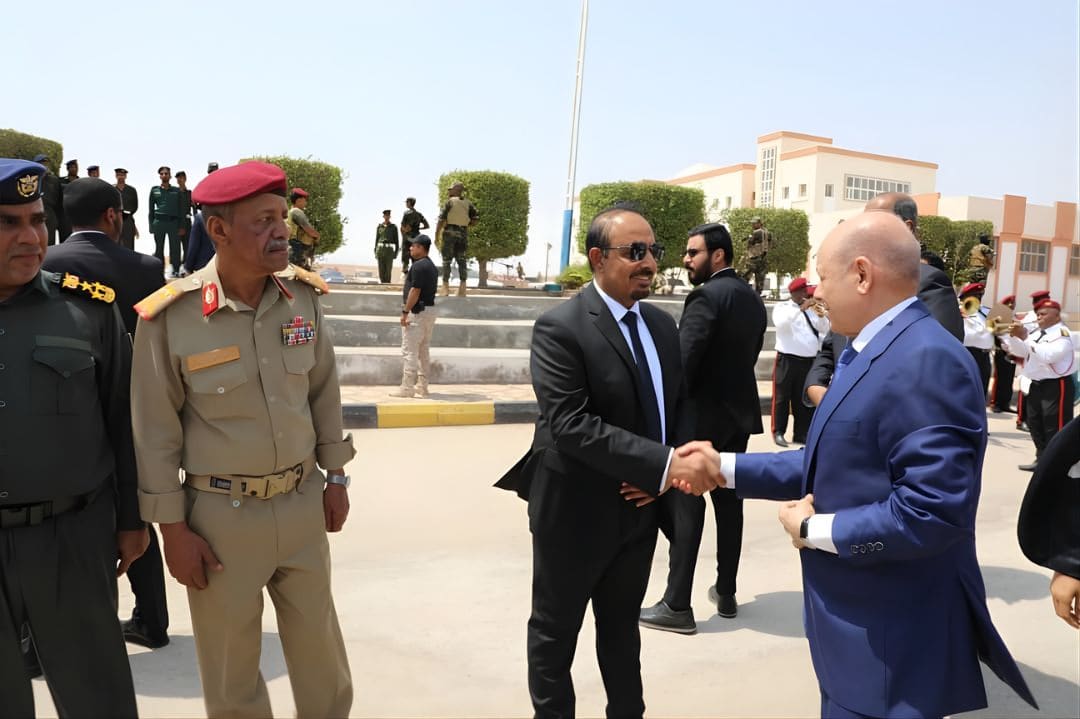
The governor of Hadramout receives Yemen’s Presidential Leadership Council Chairman in Mukalla, August 4, 2024. (South24 Center)
Last updated on: 17-11-2025 at 6 PM Aden Time
|
|
Aden (South24 Center)
Major General Faraj Al-Bahsani, member of Yemen's Presidential Leadership Council and Vice President of the Southern Transitional Council, escalated his utterances against Council Chairman Rashad Al-Alimi, accusing him of obstructing consensus-based security and administrative decisions that were supposed to be implemented to calm tensions in Hadramout.
Al-Bahsani, the former governor of Hadramout and one of the province's most prominent figures, stated in a post on platform X on Sunday (November 16) that Hadramout is witnessing "security escalation and destabilizing activities" due to what he described as "unjustified procrastination" in implementing decisions unanimously approved by the Presidential Leadership Council to restore security balance and reactivate state institutions.
He added that continued obstruction makes the Presidential Council Chairman "primarily responsible for the security deterioration” in Hadramout, warning that he might be forced to take "unilateral steps" if what he described as the "dangerous slide" persists.
This controversy revives debate around the matrix of measures to normalize conditions in Hadramout, announced by the Presidential Council on January 7. These included allocating oil revenues to establish new power stations in the Coast and Valley regions, funding a general hospital in Ghayl Bin Yameen, reviewing corruption allegations regarding the PetroMasila Company, and integrating Hadramout residents into armed and security forces according to official recruitment standards.
The matrix was introduced amid escalatory actions by the Hadramout Tribal Alliance led by Sheikh Amr bin Habrish, which had included establishing armed tribal checkpoints around oil fields and blocking fuel supplies to Aden's electricity network.
The Hadramout Tribal Alliance initially expressed a positive stance toward the matrix but later resumed escalation after its implementation stalled. An informed source told South24 Center that Presidential Council Chairman Rashad Al-Alimi was behind obstructing the matrix and undermined the agreement within the Presidential Council.
Al-Bahsani's recent accusations coincide with security and military developments in Hadramout, most notably the formation of informal forces affiliated with the Hadramout Tribal Alliance led by bin Habrish. These forces have been named "Hadramout Protection Forces," amid warnings from the Second Military Region against any formations operating outside the law.
Last week, direct clashes erupted in areas of Coastal Hadramout between security forces from the Second Military Region and tribal gunmen, reflecting the rising tensions.
On November 12, the Hadrami Elite Forces affiliated with the Second Military Region thwarted an armed ambush when a group belonging to tribal influencer Salem Al-Gharabi attacked a military patrol, resulting in injuries to three attackers and the arrest of several others.
Read more: Hadrami Elite Forces Thwart Armed Ambush in Ghayl Bin Yameen; STC Condemns Attack
This followed earlier tensions in the Rasb area when tribesmen intercepted fuel tankers destined for power stations in Coastal Hadramout, leading to injuries of two civilians during limited clashes with security protection forces.
Read more: Second Military Region in Hadramout Vows to Pursue Those Involved in Detaining Fuel Tankers
On November 15, the Hadramout Tribal Alliance issued a statement attacking the Hadrami Elite Forces and describing the security support forces of the Second Military Region as "illegal armed groups."
Al-Bahsani's escalation reflects one of the deepest divisions within the Presidential Leadership Council since its formation, occurring as political disagreements intersect with rapidly deteriorating security that could push Hadramout toward further complexity.
His open accusation also come amid the PLC initiating steps to validate the 14 appointment decisions issued by Council member Aidrous Al-Zubaidi in September, after weeks of internal Council tensions.
The appointments include positions at the levels of deputy minister, head of authority, undersecretary of ministry, deputy governor, and deputy executive directors of the Yemeni Oil Company.
Al-Zubaidi and Southern members of the Presidential Leadership Council have previously voiced concerns about unilateral decisions issued by Al-Alimi since the Council's formation. Al-Zubaidi's September 10 decisions were widely viewed as a response to these oversteps by the Council chairman.
Al-Zubaidi's decisions had prompted mediation efforts led by Saudi Arabia to prevent the escalation of disagreements within the eight-member Council.
Previous article
Next article